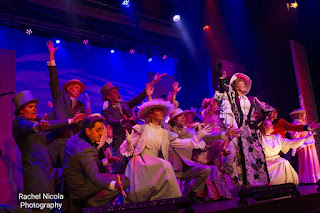Review of Translations at The Olivier Theatre | National Theatre

Love it or loathe it, the British Empire is a rich source of material that is ready-made for novels or plays – usually suggesting the English were bad while everyone else good. However, some writers have approached the subject in less obvious ways and one of those is Irish playwright Brian Friel, whose 1980 play Translations has recently been revived at the National Theatre.
1833 and in the quiet community of Baile Beag, life continues much as it always has. The inhabitants are an insular lot who speak Irish, Greek and Latin – thanks to a knowledge of the classics and the teachings of the Catholic church – but who don’t speak English, the language of their rulers. In the local ‘hedge’ school, aspiring teacher Manus (Seamus O’Hara) is working with Sarah (Michelle Fox) a local girl with a severe speech impediment. His father, schoolmaster Hugh (Ciarán Hinds) has not yet returned home and it looks as though Manus will have to step in for the next lesson. Meanwhile, Manus’ older brother Owen (Colin Morgan) has arrived after being in Dublin and he is accompanied by two officers of the British Army – Captain Lancey (Rufus Wright) and Lieutenant Yolland (Adetomiwa Edun). They are working on the six-inch-to-the-mile map survey of Ireland for the Ordnance Survey and Owen works with them as a translator. Yolland, who is young and rather romantic in outlook and who seems to have fallen in love with Ireland, is unhappy with what he perceives as a destruction of Irish culture and language. He is particularly struck by one of the pupils of the school, a woman called Maire (Judith Roddy) who, unlike most of her contemporaries, is forward-looking and wishes to learn English so that she can emigrate to America. With so much going on, and a huge gap in understanding both culturally and linguistically, the scene is set for conflict and tension to arise between the natives of Ireland and the invaders from England.
Translations could easily be seen simply as a play about British imperialism, but it is actually much deeper than that. It is a love story – between people and places – and it is a story of language and the times when you don’t actually need it. There is also a tale of the conflict when the old meets the new, and when families take different sides of an argument. Friel has certainly written a play for people to get their teeth into. To my mind, there is a problem with the text and that is the ‘comedic’ element of having everyone speak English so the audience can understand them but they can’t understand each other. Whilst this is amusing the first few times, it does rather lose its shine as the play goes on, particularly when the British end up rather stereotypically talking slowly and loudly so that the non-English speakers understand them.
However, that is a minor gripe and the play works pretty well as the story, or stories, unfold. Rae Smith’s set is huge, completely filling the stage but with a very defined area for the ‘hedge’ school building where the majority of the action took place. The background rolling clouds looked spectacular but I would have preferred if this effect had been achieved using video projection rather than pumping tons of smoke out which, particularly in the second act really seemed to hover over the auditorium. The action, especially in the first half is quite gentle but Director Ian Rickson kept things moving along well, giving the audience time to ale everything in but also ensuring the play kept to its 2 hours 45 runtime. Having a live 4 piece band under MD Dario Rossetti-Bonell to add incidental music was a nice touch and really served to heighten the atmosphere of the action on stage.
Colin Morgan was excellent as Owen, torn between his heritage and the new order under the English, and there was a tangible enthusiasm in his excitement when discovering the meaning of place names and then anglicising them for the overlords. Likewise, Adetomiwa Edun and Judith Roxy played their roles as the two young people falling in love but unable to communicate in the normal way. And Ciarán Hinds is a man I could listen to forever. If you’ve never heard Latin spoken with a Southern Irish accent before then it is worth going to the production just for that.
All in all, whilst Translations is not, to my mind a perfect play, this version gives it a level of class that surpasses any faults in the writing. Excellently staged and acted, it may be a long production but it is worth every minute.
Review by Terry Eastham for London Theatre 1




















Comments
Post a Comment